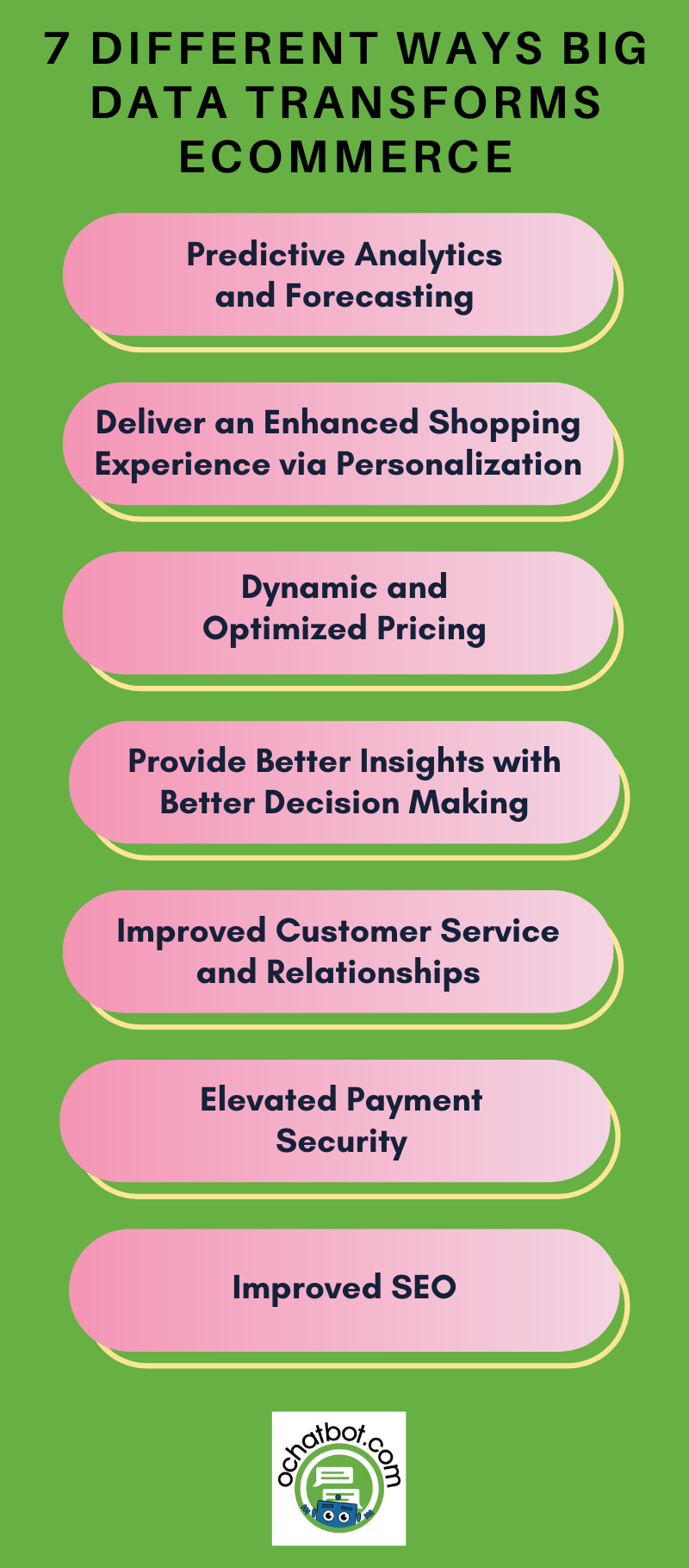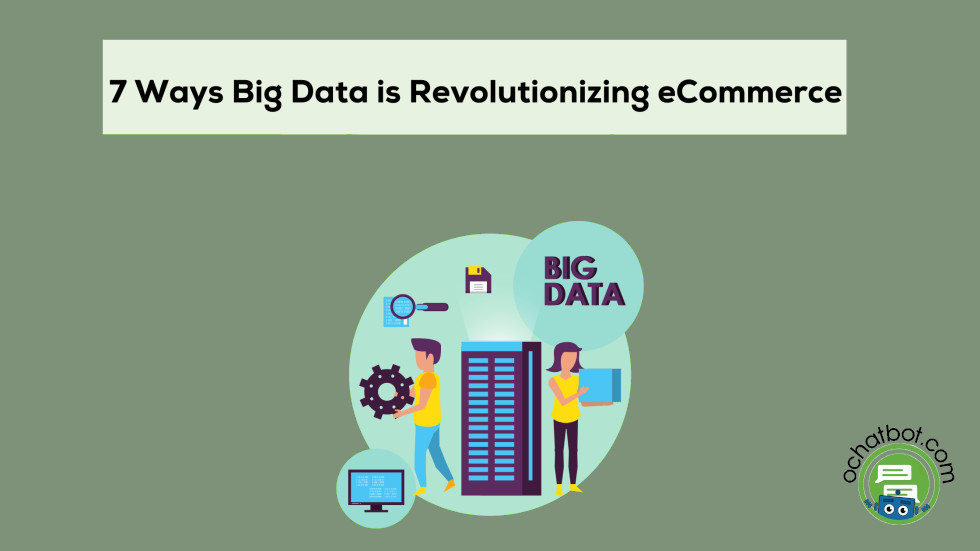In this age of information, data is wealth. According to a recent study, about 0.33 zettabytes (one zettabyte is equal to a billion terabytes or trillion gigabytes) of data are being created every day.
With colossal amounts of data being created daily, collecting and putting it to use has always been an arduous task. For businesses, this data, when used and leveraged properly can prove to be very pivotal to their success.
In the area of online business, eCommerce has been a large contributor to the data and a benefactor from it, and this exchange of data has been proven to hold a significant value on the whole business process. Now with all this data acquired, putting it to proper use is crucial.
In this article, let us see what big data eCommerce is and some of the ways it is revolutionizing the ecommerce industry.
What is Big Data eCommerce?

Before we see what big data ecommerce is, let us peek a little into what big data itself is. Big data refers to the collection of large volumes of data that can be incomprehensible to be handled by traditional data handling tools. It is often referred to as the collection of a variety of data being accumulated in large volumes with a much greater than-usual velocity. This volume, velocity, and variety are known as the 3V’s of big data. This data can be structured or unstructured and grows exponentially over time.
Big data ecommerce is a field of science and technology that focuses on leveraging data and analytics in an eCommerce store to elevate customer engagement by providing personalized responses and suggestions and enhancing customers’ shopping experience, ultimately leading to more conversions. Big data ecommerce and analytics can also be used to predict customer demands and trend shifts in the market while making predictive analyses thereby enabling you to make better business decisions and thrive ahead of the competition.
The ecommerce industry has seen exponential growth over recent years, and the concept of big data and analytics has been changing the landscape of the entire eCommerce space. Let us now see the different ways big data is revolutionizing the ecommerce industry.
7 Different Ways Big Data Transforms eCommerce

Big data and analytics have been revolutionizing the space of ecommerce in many ways, and have impacted certain sectors of eCommerce significantly, including:
Predictive Analytics and Forecasting

The future is always uncertain. But by leveraging data, it can be approximately predicted or forecasted to an extent. This is possible by analyzing past data patterns, occurrences of events and approximating the probability of various events or actions.
Using big data, ecommerce stores can predict demand accordingly. This would prevent the goods and materials from being overstocked or understocked leading to excessive costs, wastage, and ultimately poor customer satisfaction. Additionally, deploying AI chatbots can help monitor the inventory and notify customers and stockholders when a set threshold is reached.
Big data can also help eCommerce stores analyze the data from previous data points, using which peak periods can be determined, and tasks and processes can be automated and streamlined.
AI and big data can even provide an in-depth insight into your customer, and predict when or what your customer would buy. Using predictive algorithms that track customer behavior and actions, and using lead scoring to measure their value as customers, big data helps eCommerce businesses enhance and automate the predictive algorithm.
Deliver an Enhanced Shopping Experience via Personalization
Personalization is one of the most influential ways to enhance customer engagement and deliver an exceptional customer experience. But how do eCommerce stores show personalized products, suggestions, and services? Simple, with the help of data.
It enables companies to understand their customer’s needs, expectations, and pain points. Big data helps ecommerce businesses personalize their shopping experience by analyzing browsing patterns, shopping and viewing history, and interests. Additionally, integrating processes like Reverse ETL can further help businesses drive action and personalize customer experiences.
This ability to personalize can even be used for delivering proactive customer service. Big data analytics also give an eagle-eye view into the customer experience and expectations which helps segregate customers based on their preferences and choices. Ecommerce stores can then identify potential groups, send discounts and offers, and use suitable metrics based on these observed interests.
In addition to showing personalized products, big data can also help automate marketing campaigns and show targeted ads. All these factors greatly enhance the customer’s shopping experience, which in turn leads to more sales and better conversion rates.

True AI to engage customers for eCommerce, business leads, and customer support.
Create happy customers while growing your business!
-
5% to 35% Increase in AOV*
-
20% to 40% Increase in Revenue*
-
25% to 45% Reduction in Tickets with a Customer Service Chatbot
We Guarantee Results... Or Work For Free!
Dynamic and Optimized Pricing

Pricing has always been a major driving factor for sales and conversions. Predictably, customers opt to choose better deals and prices for products/services that fall within their expected price range.
Big data analytics help eCommerce companies identify the market standard price of a certain product and alter their pricing range depending on the customer base. This dynamic pricing is possible by analyzing the data acquired and collected from the customers and cookies.
Similarly, eCommerce businesses can segregate customers based on their activity, loyalty, and history by providing coupons, offers, and discounts. This data-driven pricing system is more optimized and dynamic than traditional pricing methods, which are only based on market standards and competition.
Provide Better Insights with Better Decision Making
Data is an important factor in making better strategic decisions. Data-driven decisions provide unbiased and better results, which can comply with the whole spectrum of customers.
Big data can be used to analyze customers and acquire insights on how customers perceive your products and services, pinpoint products that generate revenue, target a group of loyal customers, and even monitor and study competitors. Also, for instance, big data can assist in predictive analysis, budget determination, marketing strategies, and even customer support and service via data storytelling.
All this enables better communication with the customers and stakeholders and helps in automating the decision-making process without the need for much ponderance.
Overall, data can be the forerunner to making decisions that, by leveraging big data businesses can take a step closer to the customer and benefit them in the longer term.
Improved Customer Service and Relationships

Customers are the key to a thriving business, and the relationship they have with the business determines its success in the longer run. So, how do businesses establish a loyal relationship with their customers? By providing exceptional customer service and guaranteeing a better customer experience.
Big data becomes a crucial factor for enhancing customer service by identifying gaps in processes, defects in products or services, places of customer dissatisfaction, and even challenges in transportation, which can be a hindrance to a positive relationship.
By using AI chatbots and leveraging big data, eCommerce stores can personalize their services, improve customer feedback, and provide better customer service with faster response speeds and in-depth support across multiple channels. These factors help businesses comprehend the underlying reasons for customer dissatisfaction and make rectifications to avoid them, even before they happen.
Understanding the customer needs and enhancing your customer service, with the help of big data ecommerce, are great ways to satisfy and retain customers, and help your eCommerce business grow.
Elevated Payment Security
Security is always a pressing issue when it comes to technology. When shopping online, customers should be able to transact easily without the fear of any security breach.
Here, big data can provide insights into the security measures that help deliver a better conversion and shopping experience to customers.
Big data analytics can identify spending patterns and find abnormalities, notify and prompt when signing in, make use of OTPs, provide a timeframe when making transactions, and even track the device and location where payments are made.
For ecommerce stores, big data can provide insights into user behavior by keeping track of customer transactions and purchase history and providing centralized payment platforms that simplify customer payments. Big data ecommerce can also help add an additional layer of protection and protect customers against identity thefts and fraudulent activities.
All these advantages of big data help gain trust in online payments, which work to both the advantage of customers and eCommerce businesses.
Improved SEO

Optimizing your store based on SEO metrics is a sure way for your website to rank on top of SERP, enhance visibility, influence traffic, and thereby gain more customers.
Big data provides a way for ecommerce owners to gather insights into what people are searching for, and identify best-selling products, with the idea of optimizing them and enhancing the probability of making better sales and conversions.
Big data also helps in gathering the metrics of the website like traffic, bounce rate, and the contents of the page. Additionally, by analyzing customer search trends, businesses can improve SEO and alter their marketing strategy to better suit the customers’ preferences.
As such, businesses can identify areas of improvement, further optimize their content, and fortify areas of strongholds.
Frequently Asked Questions
How can data be used for forecasts and predictions?
By collecting data, mapping it across sample data points, and creating an algorithm using past values, future habits, and actions can be approximated.
How has big data revolutionized eCommerce?
Big data helps ecommerce businesses provide better customer service, deliver a better shopping experience, provide insight to enhance business performance and maintain longer customer relationships.
What are some ways to secure digital payments?
eCommerce businesses can secure digitally paying customers by using proper verifications, maintaining proper channels, tracking transactions and purchasing histories, and using OTPs and two-step verifications.
Data is the Future
These are some of the ways that big data ecommerce and analytics can be used in 2024. However, this will keep getting more complex and better which will prove to be advantageous to both businesses and customers.
Big data has already revolutionized the way businesses deal with the collection, interpretation, and usage of data. The ultimate aim is to not just gather the data with the available technologies, but rather, make use of these gathered data and use the insights provided by them.
Data will play a major role in the future as the global e-commerce market is expected to total $6.3 trillion in 2023 and is estimated to reach 8.1 trillion by 2025. By leveraging big data ecommerce techniques and AI chatbots, eCommerce stores can predict demands, adapt themselves to changing trends, adjust to customer preferences, and provide personalized recommendations and top-notch services that put your ecommerce store on top of the competition.
- The Rise of Intelligent Websites - February 19, 2025
- Top Trending Products to Boost Your Shopify Store in 2024 - September 4, 2024
- AI Terms Glossary: Key AI Concepts You Should Know - August 22, 2024


